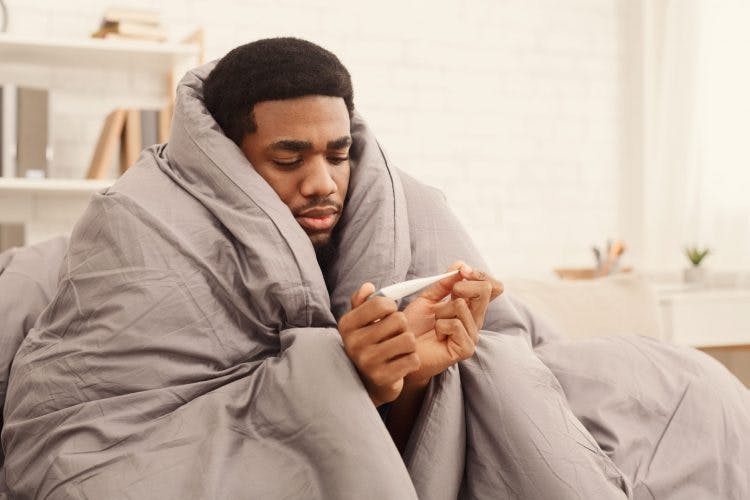Around 13% of TBI patients complain about feeling persistently cold after a head injury. This symptom may be caused by damage to the parts of the brain that control the body’s temperature.
The human body possesses a complex thermoregulation mechanism that keeps it at a balanced temperature. This delicate process is controlled by the hypothalamus, the part of the brain in charge of numerous bodily functions.
The hypothalamus helps balance body fluids and controls the release of hormones that play a part in temperature regulation.
For example, when the body gets too cold, the hypothalamus releases hormones that cause blood vessels to shrink. This traps the heat in your blood and preserves body temperature.
If the hypothalamus becomes damaged after a head injury, this process could be disrupted. As a result, you might feel cold all the time.
Neuroendocrine Disorders and Cold Sensitivity

One important gland that the pituitary stimulates is the thyroid, a butterfly-shaped gland on the front of your neck. It produces several thyroid hormones that are critical for functions such as metabolism, growth, body temperature, and several others.
If the thyroid does not receive stimulation from the pituitary gland, however, it cannot produce these crucial hormones. This leads to hypothyroidism, which can cause the following problems:
- Increased sensitivity to cold, sometimes resulting in chills
- Concentration and memory problems
- Unexplained weight gain
- Depression
- Infertility
Diagnosis & Treatment for Feeling Cold After Head Injury
The best way to stop feeling cold after a head injury is to determine the cause of your cold sensitivity.
For example, if hypothyroidism is the problem, your doctor may put you on synthetic thyroid hormones to help regulate your temperature.
On the other hand, if your temperature problems are caused by hypothalamus damage, vasopressin may help.
Normally, nerve cells in the anterior hypothalamus send signals to the pituitary gland to release vasopressin. Vasopressin has many important functions, one of which is to constrict the blood vessels to preserve heat.
If the hypothalamus does not send these signals, however, then the body will have trouble feeling warm. Taking vasopressin can help counter that effect.
Tips to Cope with Feeling Cold After TBI
Dress in Layers, dressing in a few light layers can keep you warmer than wearing a single heavy jacket.
Three layers are usually the ideal amount. Try wearing something thin like a thermal undershirt, then a wool sweater over that, and a jacket over everything.
Get Moving

Exercise helps your body burn calories and raise your core temperature. In fact, nearly 85% of body heat is generated by muscle contractions.
Therefore, if you are feeling cold after a head injury, try moving your body for at least 15 minutes every day. This can help you get blood pumping into every part of your body, which might warm you up.
Feeling Cold After Head Injury: Key Points
Cold sensitivity can occur after head injury for a number of reasons. For example, it could be a result of hypothalamus damage or even a sign of hypothyroidism.
Whatever the cause, there are remedies to help you to stop feeling cold after brain injury. Talk to your doctor about any medications that might let you feel warm again.
While you are waiting to learn the cause of your cold feelings, certain home remedies such as exercise and diet changes can be used to increase your core temperature.



Customer Reviews
Thanks for submitting your comment!